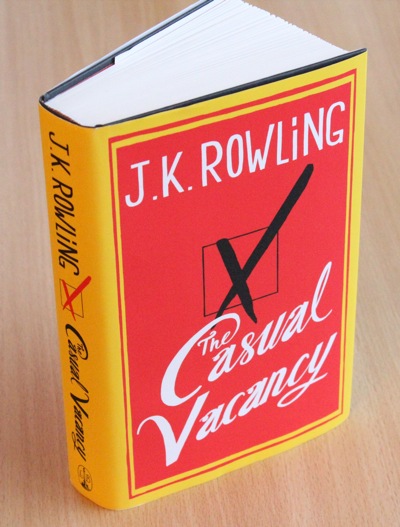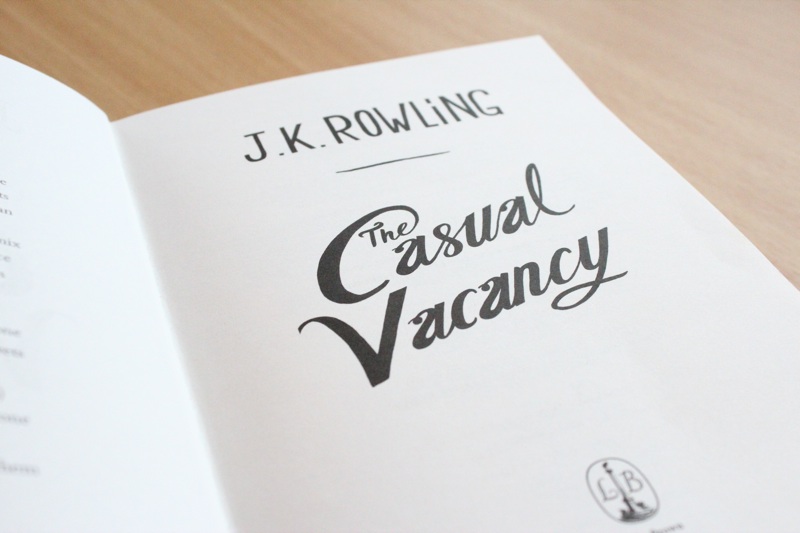 Set in the fictional town of Pagford, in South West England, where the death of one man, Barry Fairbrother, becomes the catalyst that provokes the whole novel, this story is a little like a version of 'It's a Wonderful Life' where, instead of showing the consequences of a man never having lived, we see the repercussions of his death on a tightly-knit community. However, there is no fanciful angel involved in 'The Casual Vacancy' and the story is of today and real.
Set in the fictional town of Pagford, in South West England, where the death of one man, Barry Fairbrother, becomes the catalyst that provokes the whole novel, this story is a little like a version of 'It's a Wonderful Life' where, instead of showing the consequences of a man never having lived, we see the repercussions of his death on a tightly-knit community. However, there is no fanciful angel involved in 'The Casual Vacancy' and the story is of today and real.
Barry Fairbrother's death has one particularly overbearing and potent repercussion on the community of Pagford - he was a town councillor and this means he leaves a vacant post on the council. It is the candidates for this post who we follow, along with their families, in an extremely earthy and credible storyline.
Characters are introduced in soap opera style, where we visit different houses and learn about their occupants, and as the story unfolds these lives become intertwined and connected. J.K. Rowling has a brilliant ability to portray very profound thoughts within her characters and by doing so it is entirely through these that the story is told. This is particularly true about the thoughts and feelings of the younger teenage portrayals; such as that of Andrew, who is desperately in love with Gaia, new girl in town; or Krystal, daughter of a drug addict, whose life might have been very different if Barry Fairbrother had survived; or Sukhvinder, with her dark skin and considered inadequacies that lead her to self-harm. These teenagers are the products of their parents and, significantly, their parents do not appear to realise this, being more involved in their own version of the maelstrom known as life.
 The council and community are split about whether the Fields, a council estate on the boundary of the Parish and, more particularly, the Bellchapel Addiction Clinic, should remain within the council's precept. Barry Fairbrother was born in the Fields and a great exponent of the idea that the council should do all it can to help and nurture the residents, whereas many more conservative councillors consider the area a blemish to the parish and those living there little more than the detritus of society. These opposing views are strikingly set against the individuals' actual lives and their ability to connive, lie, fornicate and basically ignore any facts connected with matters in hand.
The council and community are split about whether the Fields, a council estate on the boundary of the Parish and, more particularly, the Bellchapel Addiction Clinic, should remain within the council's precept. Barry Fairbrother was born in the Fields and a great exponent of the idea that the council should do all it can to help and nurture the residents, whereas many more conservative councillors consider the area a blemish to the parish and those living there little more than the detritus of society. These opposing views are strikingly set against the individuals' actual lives and their ability to connive, lie, fornicate and basically ignore any facts connected with matters in hand.
Following the agony and slightly malevolent humour of lives thrown in turmoil by postings on the parish website, there is a sense of inevitability about the sad occurrence of another two deaths; and the outcome of the decisions made about the Clinic should make all readers think hard about what actually matters within government and society.
 This is an exceptional book, written by a clever and thoughtful writer who has the ability to connect events from one end of the story to the other. It can be taken simply as a truly well-wrought story, but there seems little doubt that there is more that can be gained by considering the outcome and the underlying flaws within the characters that lead to this. There is something to be learned from this book, in the way it depicts 21st century life so accurately, and it should leave all readers with a sense of contemplative thought.
This is an exceptional book, written by a clever and thoughtful writer who has the ability to connect events from one end of the story to the other. It can be taken simply as a truly well-wrought story, but there seems little doubt that there is more that can be gained by considering the outcome and the underlying flaws within the characters that lead to this. There is something to be learned from this book, in the way it depicts 21st century life so accurately, and it should leave all readers with a sense of contemplative thought.



